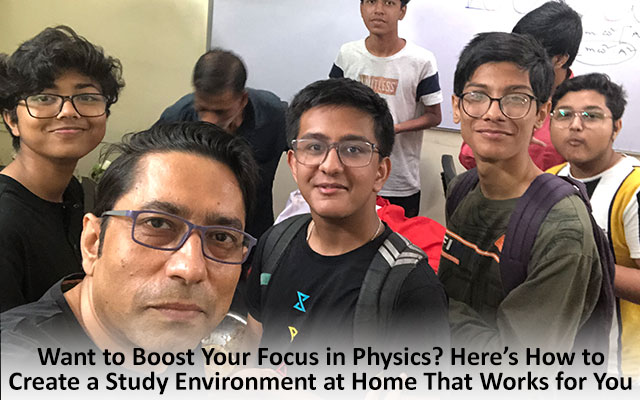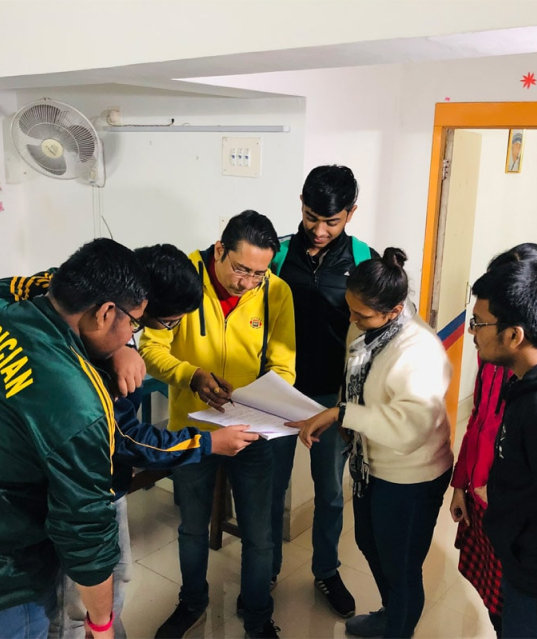Studying physics at home can be overwhelming. You sit down to focus, but distractions creep in. The equations look confusing. The concepts feel distant. Slowly, your motivation fades — and you close the book.
If that sounds like your daily struggle, you’re not alone.
Physics is a subject that demands attention, clarity, and a calm mind. It’s not just about memorising formulas — it’s about understanding the why behind every law and principle. That’s only possible when your study environment supports your concentration.
In this blog, we will guide you step by step on how to build the right study space, develop better habits, and approach physics in a way that finally makes sense. Whether you are preparing for boards or competitive exams, these tips will help you focus better and learn faster.
Create a Study Space That Works for You
Your study area plays a big role in how well you learn. A messy desk or a noisy background can instantly break your flow. So before jumping into formulas, start with your space.
1. Keep It Clean and Clutter-Free
Only keep what you need — your physics book, notebook, stationery, and maybe a bottle of water. A neat desk helps clear your mind.
2. Use Proper Lighting
Good lighting is crucial. Natural light is ideal, but a bright desk lamp also works well. Avoid dim lighting — it makes you feel sleepy and dull.
3. Find a Quiet Corner
Choose a spot at home where noise won’t disturb you. If that’s not possible, use noise-cancelling earphones or play soft instrumental music.
4. Make It Comfortable
A good chair, a supportive backrest, and a decent table height can make long study hours bearable. You don’t need a fancy setup — just something that won’t leave you with back pain.
5. Add Motivation
Stick up a physics quote. Keep a “concept tracker” or checklist. Add a small whiteboard for formulas. Little things like these make your space feel more like your zone.
Build a Daily Physics Routine That Sticks
You don’t need to study for 6 hours a day to master physics. You need consistency.
1. Pick Fixed Time Slots
Train your brain to expect study time at the same hour daily. Morning slots are great because your mind is fresh, but pick a time that works for you.
2. Use the Pomodoro Technique
Study for 25–30 minutes, then take a 5-minute break. After four cycles, take a more extended 15–20 minute break. This boosts focus and prevents burnout.
3. Avoid Multitasking
Physics needs full attention. Don’t switch between subjects or check your phone. Focus on one concept at a time.
4. Set Daily Mini Goals
“Finish one derivation,” “Understand projectile motion basics,” “Solve 10 MCQs” — small goals keep you on track and give a sense of achievement.
Learn Physics the Smart Way
Now that you have the right space and time, it’s time to study smarter. Physics isn’t about mugging — it’s about understanding.
1. Visualise Every Concept
Diagrams, motion graphs, videos, and real-life analogies help you see what’s happening. Don’t just read — visualise.
2. Don’t Fear Formulas
Instead of memorising blindly, understand where a formula comes from. What does it measure? What units does it use? How is it applied?
3. Solve, Solve, Solve
The more problems you solve, the more confident you get. Practice every question type — theory-based, numerical, diagram-based, and tricky MCQs.
4. Make Mistakes Early
Get stuck. Get confused. Get it wrong, but understand where you made the mistakes. That’s how you grow. Learn from your mistakes and don’t shy away from re-attempting questions.
5. Teach Someone Else
Teaching a friend or explaining a concept out loud helps you understand it better. If you can explain it, you’ve got it.
Stay Physically and Mentally Ready
Good focus comes from a good body and mind. If your health suffers, your studies will too.
1. Move During Breaks
Don’t just scroll Instagram. Stand up, stretch, do a quick walk or 5-minute yoga flow.
2. Eat Brain-Boosting Foods
Nuts, fruits, water, and light snacks help your brain stay sharp. Avoid junk that makes you sleepy.
3. Sleep Well
You can’t learn anything if your brain’s foggy. Aim for 7–8 hours of sleep daily, your mind needs rest to retain concepts.
4. Breathe and Reset
Feeling overwhelmed? Close your eyes and take deep breaths for a minute. Clear your thoughts and come back strong.
Why choose IB’s Expertise for Physics coaching in Kolkata?
When it comes to mastering physics, guidance matters. Here’s why IB’s physics coaching center is a step ahead:
- With over 22 years of teaching experience, you learn from experts who know what works.
- A modern hybrid class model lets you study in person or online, so you get flexibility in studying.
- A proven track record of excellent results.
- Our students consistently achieve top grades and clear entrance exams.
- Activity-oriented classes make concepts fun and memorable, blending theory with real-life experiments and demonstrations.
- Regular doubt-clearing sessions and assessments keep you on track.
With IB sir, you build a rock-solid foundation for future studies in physics and beyond.
Let Physics Interest You
Physics isn’t just another subject. It trains your brain to think in new ways. It teaches you how the world works, from your phone’s screen to the movement of planets.
When you study it with the right environment and energy, physics becomes less of a struggle and more of a puzzle you enjoy solving. So, set up your space. Get into a routine. Ask for help when needed.
Don’t let distractions and doubts slow you down
Boost your physics knowledge by enrolling at Study with IB, the best physics coaching center in Kolkata.
People Also Ask
1. How long should I study physics each day to see improvement?
You don’t need to spend hours. Even 1 to 2 focused hours a day can show great results, provided you stay consistent. Quality matters more than quantity. Stick to a routine and keep distractions away.
2. What should I do if I keep forgetting physics formulas?
Try writing formulas on sticky notes and placing them around your study space. Use flashcards, practice them regularly, and most importantly, understand what each formula means and where it comes from. Once the logic clicks, memory follows naturally.
3. Is it okay to watch YouTube videos to learn physics?
Absolutely. Visual learning helps with tough concepts. However, be sure to watch high-quality educational content and follow it up with practice. Don’t just watch — pause, rewind, and take notes like you would in class.
4. What are the best reference books for physics apart from textbooks?
Start with HC Verma for concept clarity. For practice, the DC Pandey series, NCERT Exemplar, and previous year question papers are excellent. Choose one or two good books and stick to them. Don’t overload yourself with too many resources.
5. How can I reduce exam anxiety while studying physics?
Break topics into small parts. Celebrate small wins. Avoid comparing yourself with others. Practise mock tests regularly. It builds confidence. Also, remember to take breaks, eat well, and get proper sleep. A calm mind is your best study partner.





